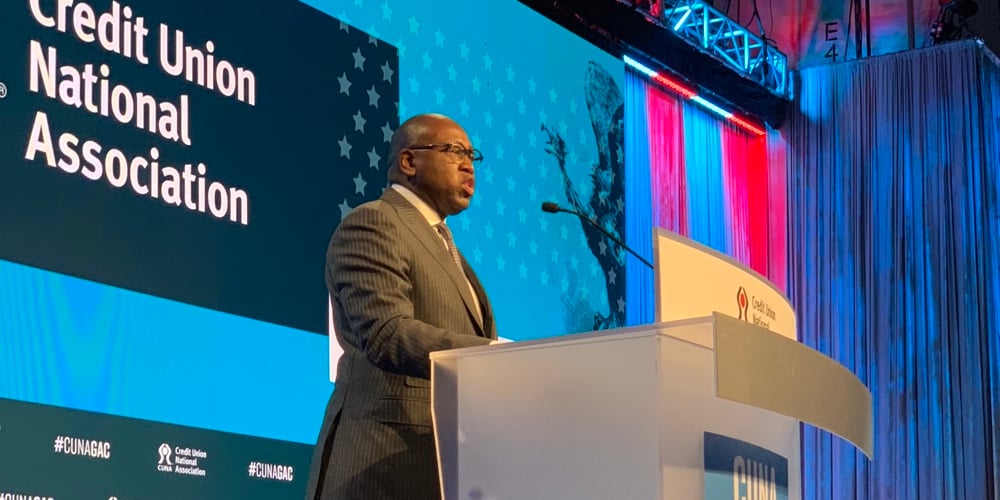A leader fit for his time: Rodney Hood’s legacy in a time of financial chaos
 Rodney Hood onstage at the 2020 CUNA Governmental Affairs Conference (CUInsight photo)
Rodney Hood onstage at the 2020 CUNA Governmental Affairs Conference (CUInsight photo)
It wasn’t exactly a given he would work in financial services.
Behind an intense passion to serve the public good, Rodney Hood’s first career choice was the ministry, according to his school, the University of North Carolina, even applying his values of humility, compassion, effort, integrity, and service to others through his international missionary work.
While life may have had different plans for him, whether it was ministry or financial services, it didn’t matter. Rodney Hood was going to change lives for the better. And taking a look back from his rolling off of the National Credit Union Association (NCUA) Board, I think it’s safe to say he accomplished that objective many times over.
Whether you want to spotlight his term as chairman of the NCUA, his double tour as an agency board member, or any other appointment in his 25 years of dedicated service, Rodney Hood’s contributions, accomplishments, and influential leadership in the mainstream credit union system, especially during historically challenging times, deserves universal recognition, appreciation, and commendation.
The best man for the worst time
If anyone wasn’t sure who or what Rodney Hood represented by the time he assumed the top job at the NCUA, it didn’t take long for them to find out.
“Credit unions arose and grew not out of government fiat,” Hood said soon after taking office in April 2019. “Instead, they grew from a grassroots movement of people who were forgotten and were being left behind. At every step, it was about the promise of people helping people. It was the promise of people working together to use their assets to invest in their communities.”
That “promise” Rodney Hood adopted and put into action took form in the power of financial inclusion – the idea, the initiative, that everyone should have access to affordable, useful, and necessary financial services in a responsible way – was what Hood described as the “defining civil rights issue of our time.” In a lot of ways, it was the backbone for many of the accomplishments realized on his watch, including the promotion and encouragement of digital transformation and digital small-dollar lending during the start of the pandemic a year into his tenure as NCUA chairman.
Even prior to the pandemic, Chairman Hood had the foresight, the vision, to recognize the necessity of moving digital transformation forward and infusing the benefits of financial technology, or fintech, into member-owned credit unions. With the evolution of financial inclusion through smartphone technology and mobile access in the late-2010s, Hood knew the time to move was now. What he didn’t know was that a global pandemic was just around the corner to prove him right.
Of course, Rodney Hood can account for any number of accomplishments when it comes to financial inclusion. In a recent article, finance veteran Michael Macchiarola highlighted Hood’s effect on the NCUA’s DEI Summit, which has grown every year since its first, along with the success of the ACCESS Initiative, an NCUA program Hood championed that helps credit unions bring more people and families into the mainstream financial system.
“People helping people,” centering on the underserved
Under Hood’s leadership during the pandemic in 2020, one of the NCUA’s three recommended changes to lending standards to help credit unions included permanently expanding credit union reach for underserved areas. More specifically, it meant authorizing all credit union charters to apply for serving areas designated as underserved. The expansion immediately provided access to financial products and services to those who may have been the most impacted by the pandemic.
In a related change, and a rule change very special to my heart as a Navy veteran, was the expanded ruling to include active military personnel when determining a credit union’s low-income designation. This expanded LICU rule granted military personnel a standing close to that of students going to college, universities, vocational, or technical schools for the intentions of the NCUA’s consideration of a credit union’s LICU status.
“This is a great step in being more inclusive when it comes to the members of the military,” Hood said at the time. “Because so many military members are just getting started, they may not have much experience in working with financial institutions, at least not yet . . . under my direction, the agency has determined we can encourage military service in a similar way [to students].”
There are so many areas to which Rodney Hood’s influence has reached. But from my viewpoint, his efforts in prioritizing the value of credit union service organizations (CUSOs) and the need of small-dollar loans in today’s financial world has been key to the present and future of the credit union movement. Hood has praised CUSOs’ role in steady membership growth and deposits, growth that currently stands in the area of $2.3 trillion. Of CUSOs’ influence on consumers, he said, “When I look at the uptick in loans in the country, there is a direct correlation, and I would say causation, between the states with 50 or more CUSOs and that growth.” We can never underestimate his advocacy and influence on behalf of this still-growing industry.
In regard to helping underserved communities through small-dollar lending, Hood offered, “I often say financial inclusion is the civil rights issue of our day. I continue to advocate for all of us in the system to work together to provide small-dollar loans to marginalized communities.” I will always appreciate and respect the small-dollar loan programs and initiatives Rodney Hood pushed forward to grow marginalized neighborhoods’ and communities’ financial destinies.
Finally, it isn’t merely Rodney Hood’s accomplishments that should serve as the blueprint for the future of the credit union movement. Rodney is the blueprint. In good faith, he represents all the best that credit unions have stood for through nearly 120 years. Right next to his non-stop energy in reinforcing the credit union difference, his unwavering positivity, and steely dedication to “people helping people,” he will be remembered for his constant determination and lasting record of success when it comes to financial inclusion.
Those efforts, and their impact on bettering the lives of countless Americans and their families, deserves our enduring gratitude, appreciation, and ultimately, inspiration, moving forward.

